More and more people want to declare war on plastic waste! In our Disposable society every German produces an average of almost 40 kilograms of plastic packaging waste per year.₁ Figuratively speaking, that's an entire garden shed stuffed full of trash bags.
But our plastic mania has serious consequences for nature, wildlife and our health. Fortunately, there are countless ways to reduce plastic waste in all areas of everyday life.
In this article I would like to give you my most valuable tips and show you how a life without plastic can work. Let's go!
Here you can find a short overview in advance:
- Mindset and organization
- Bathroom and body care
- Transport and storage
- Kitchen and nutrition
- Household and shopping
- Work and office
- Consumption and leisure
- On the road and traveling
- Community and activism
- Closing words
Advantages: Why live plastic-free at all?
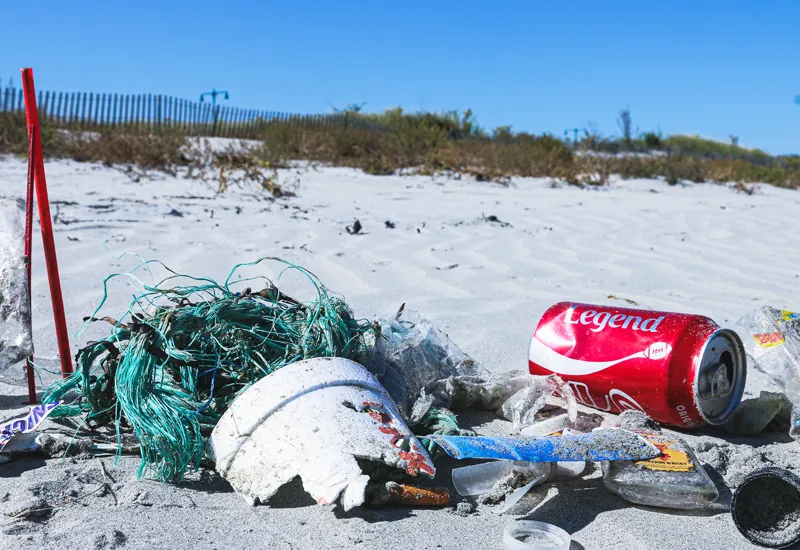
First, let's take a brief look at the reasons for living without plastic or the Disadvantages of plastic to understand why all this is worthwhile in the first place. The knowledge helps, Permanently motivated and to remain plastic-free in the future within the scope of your individual possibilities.
Protect environment and animals
Plastics are not biodegradable and only decompose over centuries into Microplastics. Disposed of in nature, plastic waste costs worldwide up to 135,000 marine mammals and one million seabirds each year.that eat it or strangle themselves on it.₂
Minimize greenhouse gas emissions
The Production of just one ton of plastic generates almost two tons of CO2. If the material is disposed of properly at all, the incineration of the waste even generates another 2.7 tons of the greenhouse gas.₃ So doing without plastic reduces your ecological footprint and counteracts the climate change against.
Stay healthy
Plastic can contain, among other things, the plasticizer Bisphenol A (BPA) which is considered carcinogenic and damaging to the nerves.₄ In addition, it can Microplastics in the food chain and enter the groundwater, so that we eventually absorb the toxins again.
Conserve natural resources
Plastic is removed from the natural resource Petroleum manufactures. It is only available to us humans to a limited extent. Living without plastic therefore supports the most sustainable and future-oriented use of the planet's limited raw materials.
Being a responsible role model
Living plastic-free promotes the Environmental awareness and sustainable actions in our society. By making the responsible decision to avoid plastic, you also inspire others to act in a more environmentally friendly way. Last but not least, you are a positive role model for future generationswhich include your children and grandchildren.
Save money
Furthermore, you can save money by living a plastic-free lifestyle. For example, since you you always pay significantly more for disposable products in the long run than for reusable alternatives.
100 tips: How can I avoid plastic waste in everyday life?
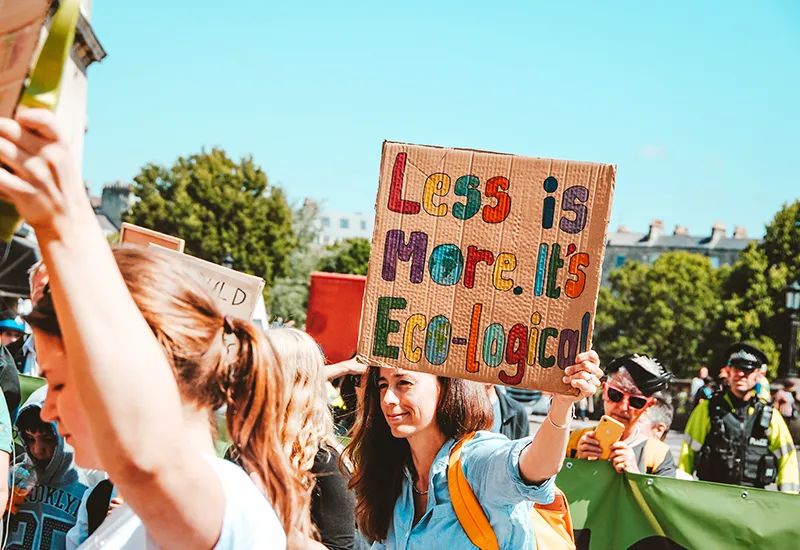
By the way, the challenge of "living plastic-free" started for me with a trip to Sri Lanka in 2015.I was on the beach, where I was confronted with a wide variety of plastic waste, and I immediately began to collect it. Subsequently, my experiences with the conscious plastic avoidance in everyday life began.
Here I would like to share with you my most valuable tips and learnings from the last few years.
Good to know: I've divided the advice into categories just to give you a better overview - but many of them fit well into other everyday areas, too, of course.
Mindset and organization
Let's start with the Basic setting for a life as plastic-free as possible. With the following tips, you can make a real difference and avoid quite a bit of waste throughout your life.
1. replace disposable with reusable.
In order to avoid plastic waste, it is important to keep things to be reused for as long as possible. So, for example, swap short-lived disposable products like plastic cutlery for long-lasting, reusable, reusable alternatives like stainless steel or wooden cutlery.
2. reduce general consumption.
Think and live minimalist and limit possessions, consumption and material desires to the things you really need.
3. fix things that are broken.
Repair things that no longer work, instead of throwing them in the garbage can. This is also an important basic rule of the Zero Waste Lifestyle, in which plastic avoidance plays a major role.
4. borrowing objects and walking towards each other.
To unnecessary plastic packaging to avoid, you can also get things you need from from friend:inside or neighbor:inside borrow them instead of buying them yourself and brand new.
5. refill instead of throwing away.
If you want to live plastic-free, you should Prefer things that can be refilled. For example, printer cartridges, dental floss bottles or dishwashing detergent.
6. upcycling and giving things a second chance.
If something is absolutely broken or is no longer needed, you can Reuse in another function. For example, from plastic bottles you can make flower pots.
7. reject and say no.
To live plastic-free, it helps immensely, if you do not accept everything. So if you are offered a free plastic pen or business card at a trade show, for example, you should turn them down.
8. use all-purpose weapons instead of countless products.
Go for products that versatile are. Quite according to the motto "less is more you can save yourself countless packaged remedies from the drugstore, for example, with the home remedies sodium bicarbonate, soda and vinegar essence.
9. unmask microplastics with CodeCheck app.
Whether acrylate copolymer (AC) or polyquaternium (PQ) - Microplastics have many, meaningless names! With the CodeCheck app you can scan products in the drugstore, for example, and see at a glance whether they contain the small plastic particles.
10. collect your garbage for a week.
For a good start, it is always recommended to collect your plastic waste for at least a week. After that you can then analyze and consider how you can avoid the individual plastic packaging in the future if possible.
11. separate waste correctly.
Of course, plastic waste cannot be completely avoided! So check with your local waste management companieshow you can use the Separate waste correctly, so that the plastic can be recycled and reused.
Bathroom and body care
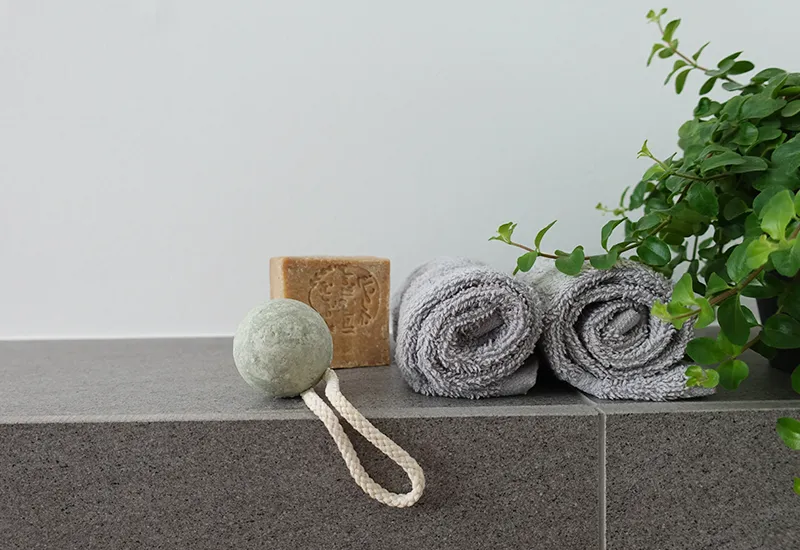
In the next step, let's take a look at the Zero Waste Bathroom throw where experience shows that there is great potential for less plastic waste is waiting to be used.
12. use cosmetics in one piece.
Solid personal care products are usually packaged in paper, making it easier to live as plastic-free as possible. Get yourself for example Hand cream, shower gel, shaving soap and shampoo in solid form.
Here are some recommendations on my part:
Tip: Good places to go for plastic-free natural cosmetics are above all the stores of hellosimple*, avocadostore* and PlantBase*.
13. use metal razor plane.
With a reusable Straight razor you avoid disposable razorswhich would otherwise end up in the yellow bag after a short time. This one* I can highly recommend it to you.
14. put on washable cotton pads.
Also washable Fabric cotton pads are reusable and reduce the consumption of disposable cotton pads. If you need some, you can find them here*.
15. get cloth handkerchiefs.
Washable Cloth handkerchiefs replace paper tissues and avoid both paper waste and (often duplicate) plastic packaging. They make your life much easier without plastic. If you like, get it here*.
16. use cloth diapers instead of disposable diapers.
A newborn baby needs about 6 to 8 fresh diapers a day. Throughout the diapering phase land Around 5,000 disposable diapers per child in the garbage can.₅ Cloth diapers are therefore a much more sustainable and waste-reducing alternative.
These cloth diapers* you can even alternatively still use as a bib.
17. use solid deodorant.
Also solid deodorant and deodorant cream in jar save plastic packaging and aluminum waste by deodorant sprays and are usually free of harmful ingredients.
In keeping with this, I have a few recommendations for you again:
18. brush teeth with wooden toothbrush.
Wooden toothbrushes are biodegradable and compostable - and a wonderful alternative to plastic toothbrushes. I can recommend these wooden toothbrushes*.
Notice: The bristles must be cut off before disposal and thrown into the yellow bag. You can reuse the stem, for example, as a support for smaller potted plants.
19. get refillable dental floss in glass bottle.
Dental floss is unfortunately often made of plastic and sold in a disposable container. But it is also available as a refill pack of corn fiber with vegetable wax in a glass bottle. Here you get the floss*.
20. use toothbrush tablets instead of tube toothpaste.
Toothbrush tablets replace the classic toothpaste from the plastic tube and dissolve in the mouth. You can buy them loose or in paper and use them (almost) as usual. Secure yourself here the toothbrush tablets without plastic*..
21. clean ears with metal cleaner.
Metal ear loops are reusable and thus prevent the consumption of disposable cotton swabs. Although of course they also produce some waste, bamboo ear sticks are another plastic-free alternative.
22. use menstrual cup.
Menstrual cups are reusable and replace disposable products such as tampons and padswhich creates an unbelievable amount of plastic waste. If you like, you can get a menstrual cup here*.
23. use plastic-free lip balms.
Classic "Labello's" - and even colored lipsticks - are also available in the paper packaging with purely natural ingredients. Ideal to make your life even more plastic-free.
Transport and storage
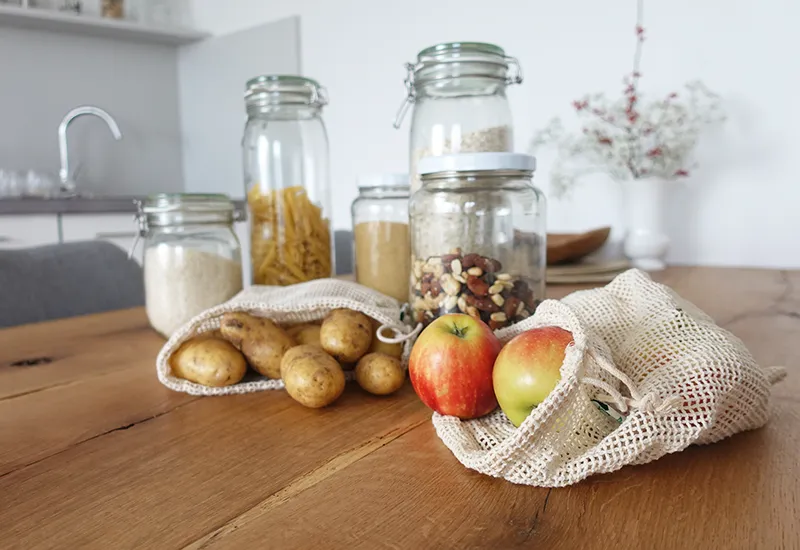
Learned a lot already? Then let's relaxed to the next everyday area go over! Because even when transporting your food or storing it, there is a great potential for avoiding plastic waste that wants to be used!
24. use canning jars.
Preserving jars are versatile and are ideal, for example, for the Storage of food and supplies - or also to the loose purchase of groceries. If you like, get it here*.
25. use stainless steel lunch boxes for transportation.
Stainless steel lunch boxes are durable, easy to clean and replace plastic Tupperware, as well as ToGo packaging material. I personally use this lunchbox* - for half an eternity.
26. freeze food in cloth bags.
To Freeze food without plasticFor example, you can use cloth bags. This works very well for bread, for example. But also in jars, lunch boxes or paper many foods can be frozen and preserved longer.
27. wrap food in oilcloth.
Vegan oilcloth are a sustainable Alternative to plastic cling film. They are washable and reusable forever. I can recommend these*.
28. carry groceries with cloth bags and backpack.
Transporting groceries in a cloth bag or backpack is an extremely eco-friendly Alternative to plastic bagthat makes your plastic-free everyday life so much easier.
Kitchen and nutrition
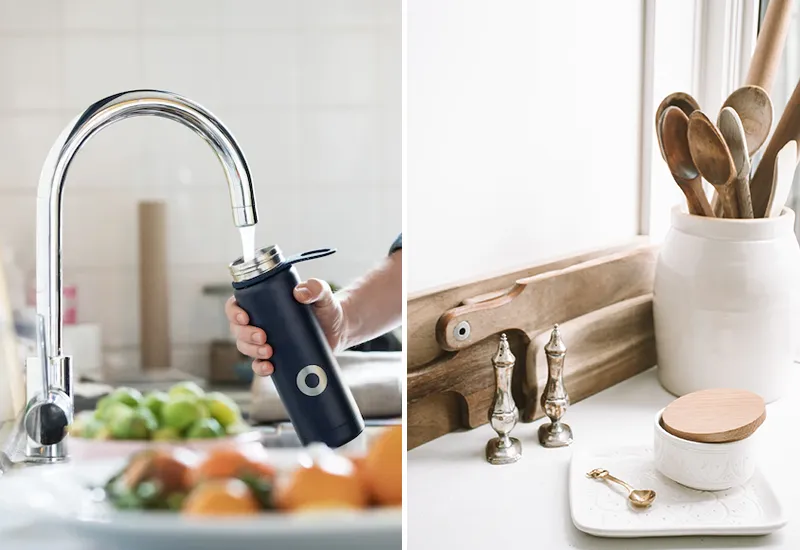
Plastic waste can be combated especially well in the kitchen and at daily meals. Here is also for this a whole List of inspirational tips and tricks.
29. use cloth towels instead of kitchen paper.
Kitchen towels made of cotton are washable, versatile and mainly replace the classic disposable kitchen paper, which is usually wrapped in plastic film is wrapped. Plastic free wrapped get it here*.
30. get wooden kitchen gadgets.
Whether Spatula, cooking spoon or soup ladle - Kitchen utensils can also be made of wood and make your everyday life even easier without plastic. I can recommend this set*.
31. enjoy roasted coffee instead of capsule coffee.
Roasted coffee avoids plastic and aluminum capsules and is available loose, as well as wrapped in paper. If you like, you get here fair trade organic coffee in a paper bag*..
32. grow your own fruits, vegetables and herbs.
Growing food in the garden or on the balcony Reduces plastic packaging of fruits and vegetables and makes your everyday life not only much more plastic-free, but also healthier.
Use natural dishwashing brushes and sponges.
Wooden dishwashing brushes are an environmentally friendly Alternative to short-lived plastic brushes. You can also use rinsing sponges, which are of course also available without plastic.
In keeping with this, I have a few recommendations for you again:
34. drink tap water.
By using at home and on the road Drink tap water, you avoid plastic bottles and save a lot of energy during production and recycling.
Tip: You think the "Kraneberger" tastes too boring? How you Add flavor to tap water I'll be happy to explain in a separate blog article!
35. drink wine with natural corks and collect them.
By vegan wines with natural corks, you are making a real difference for animals and also avoid plastic corks. You can also collect the real corks and then use them as part of the NABU CORK Campaign send in and have recycled.
36. use wooden cutting board.
Wooden cutting boards are durable and much more environmentally friendly than the plastic kitchen boards. In addition, the plastic components that come out of the board during cutting are a health hazard.
37. prefer plastic-free chewing gum.
Plastic is also found in chewing gum! Did you know that? By Plastic-free chewing gums without petroleum-based ingredients so your life without plastic will be even easier and healthier. This one* I can recommend to you.
38. make ice cubes in stainless steel mold.
Stainless steel molds replace plastic ice cube molds wonderful and are also much more durable and environmentally friendly. In addition, the ice cubes do not come into contact with the plastic. A metal ice cube mold you get here*.
39. use cloth napkins.
Cloth napkins are reusable and reduce the consumption of disposable paper napkins. These linen napkins* I can recommend to you.
40. prepare tea loose in tea strainer.
You like to drink tea? Then you can use the Plastic tea bags and thus avoid unnecessary waste, by making your Buy favorite tea loose in paper and bring it to you in a Stainless steel tea strainer boil up. This tea strainer* I can recommend to you.
Tip: I have also given you a detailed blog article about the possible plastic free kitchen written. Feel free to take a look!
Household and shopping
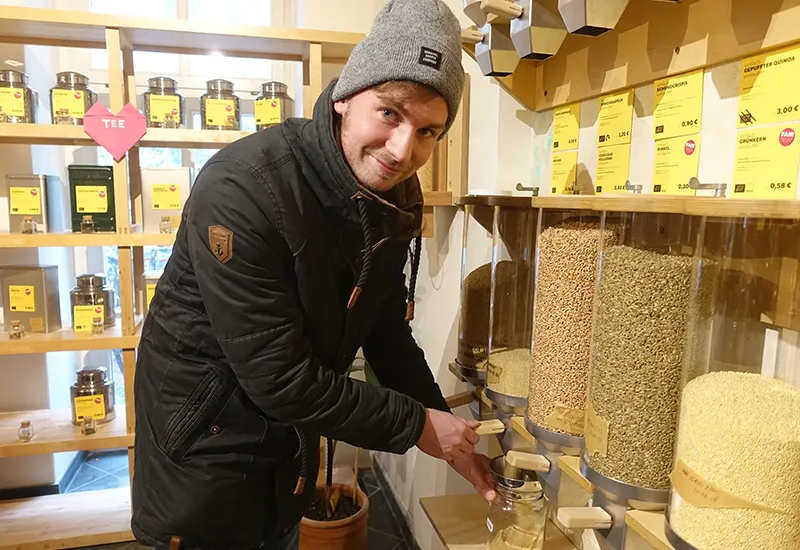
Fancy the next tips for plastic-free living? Then next, feel free to implement the following things in your household and shopping to avoid even more plastic waste in your everyday life.
41. buy products packed in glass instead of plastic.
Prefer products in jars in order to less waste due to plastic packaging to make. For example, every supermarket sells milk and yogurt in deposit jars or spreads, dried tomatoes and olives in small glass containers.
42. buy only as much as you need.
Make yourself a Weekly plan with the food you need and shop strictly according to it. So you prevent food waste by spontaneous purchases and can save unnecessary packaging material.
43: Conscious unpackaged shopping.
If you want to live plastic-free, it would be ideal if you could an unpacked store near you and visit him often. But also in supermarkets, weekly markets and organic stores you can buy many foods loose, unpackaged and plastic free shopping.
44. buy bakery products in cloth bag.
Bakeries often wrap bread, rolls and co. in paper or plastic. You can avoid the waste by using a Fabric bag you take with you and has the baked goods put in there.
45. use fruit and vegetable nets.
Fruit and vegetable nets Cotton Replace, as is to be expected, the free plastic bags for fruit and vegetables. They are reusable and therefore ideal to reduce plastic waste. These nets* I can recommend to you.
46. cook for yourself and avoid convenience foods.
Home cooked meals with fresh ingredients Reduce plastic waste from pre-packaging and promote a healthy diet.
47. plastic-free shopping at the fresh produce counter.
Sausage, cheese, olives and many other foodstuffs can also be filled into containers at your local fresh food counter, so you can Save plastic film and other packaging material.
Good to know: Personally, I eat a purely plant-based diet and avoid animal products for the animals, the environment and my health. Why I live veganI'll be happy to explain this to you in a separate blog post.
48. buy toilet paper loose or in cardboard packaging.
Also toilet paper is often wrapped in plastic film. Thereby, toilet paper is also available loose or in the paper packaging. I can recommend this one*.
49. feed pets with a plastic-free bowl.
Feeding bowls made of porcelain or stainless steel can be reused forever and avoid buying often short-lived plastic balls. This bowl* I can recommend for your four-legged friend.
50. use paper dog waste bags.
Paper dog waste bags are biodegradable and an environmentally friendly Alternative to the plastic feces bags. I personally use this one* for our little dog.
51. stop advertising in the mailbox.
Stick a sticker with the inscription "Please do not post advertising!" on your mailbox., to unsubscribe from unsolicited advertising by mail and avoid lots of paper and plastic waste.
52. do not use garbage bags or use newspaper.
For plastic and paper waste you do not need plastic garbage bags. And you can also use the bio garbage can with folded newsprint or lay out some cardboard to further minimize your plastic waste.
53. cleaning with effective home remedies.
Natural home remedies like Baking soda, soda, vinegar, Citric acid and Curd soap save the environment and avoid buying a lot of chemical cleaning products in plastic packaging. Fittingly, I can offer you the Book "Five home remedies replace a drugstore". recommend that you get here*.
54. make drugstore products yourself.
With just a few natural home remedies you can also make the usual drugstore remedies yourself. Here you can find some examples with suitable DIY instructions:
- Make your own mouthwash with water, baking soda and xylitol,
- Make oven cleaner from baking soda, vinegar and table salt
- Make dishwashing liquid from ivy leaves
55. build furniture yourself.
Anyone who has ever ordered new furniture on the Internet knows how much plastic waste is produced in the process - whether it's Styrofoam or foil. By building your own tables and other furniture from old wooden planks, you can save a lot of plastic waste.
Here are some posts for inspiration:
- DIY build your own dining table from old oak planks
- Do It Yourself Desserts Build
- Build oak coffee table yourself
56. prefer paper tape.
Through Sellotape and plastic tapes on packages creates a lot of plastic waste, but it is avoidable. Fortunately, there are also Paper tape without plastic, with which you can, for example, gifts or shipping boxes wonderfully and plastic-free packaging. This one* you should definitely give it a try.
Work and office
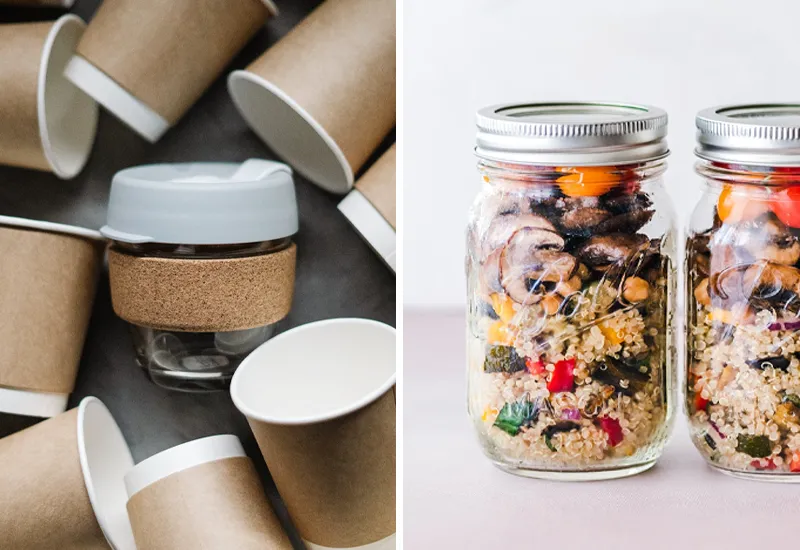
In everyday working life and of course also in the home office you have more zero waste options to save as much plastic waste as possible. Just use the following tips!
57. get a reusable coffee to go cup.
Reusable cup replaced single-use plastic waste with coffee-to-go cups. Fill them up at home or in the café. I can recommend this cup*. Another alternative is, of course, the relaxed coffee in the café from the porcelain cup.
58. drink coffee without filter waste and capsules.
Cook your coffee in a fully automatic coffee machine with loose beans and thereby avoid aluminum capsule and filter waste. We have this fully automatic coffee* at home. For a plastic-free filter coffee I can you and your colleagues also recommend this reusable organic cotton filter*..
59. pre-cooking or making Mealprep.
Just cook a little more of your food in the evening to pack for the next day and avoid ToGo waste during the lunch break. Alternatively you can also use a vegan meal prep prepare for the entire week.
60. writing with refillable pens.
Prefer refillable pens and pencils in your work as sustainable Alternative to the usual disposable pens.
61. quit smoking or use pocket ashtrays.
If you want to live plastic-free, you should stop smoking or at least such a pocket ashtray* use so that no more toxic cigarette butts with plastic filters end up on the ground.
62. use refillable printer cartridges.
In the office, you should prefer refillable printer cartridges to keep the Dramatically reduce plastic waste for printer ink.
63. inspire colleagues to avoid plastic.
Raise awareness among your colleagues incidentally or actively for plastic avoidance. This joint, positive change in the company welds together.
Consumption and leisure
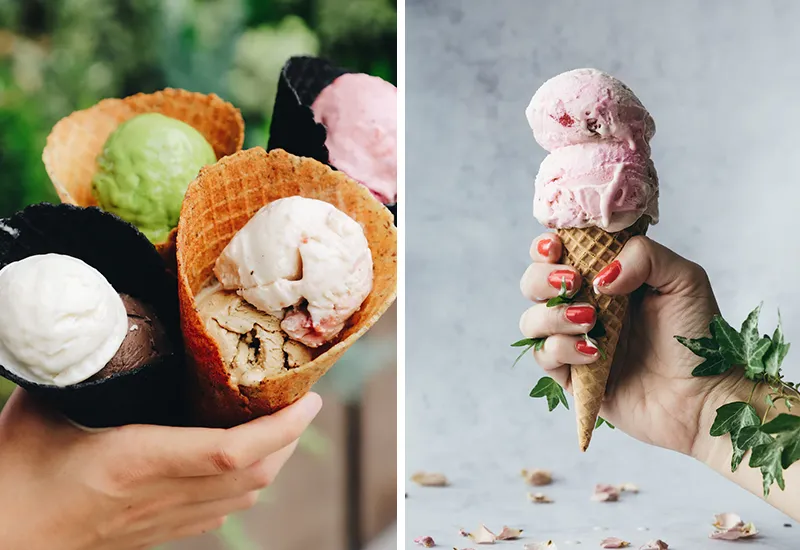
Now we come to an extremely large area of everyday life, namely the Consumer behavior and leisure activities. What exactly you can do to live even more plastic-free, you will now learn in the following tips.
64. always question the necessity of a purchase.
Consistently question any potential new purchase if you want to avoid unnecessary plastic waste and preserve natural Conserving the earth's resources in everyday life want. Just ask yourself the following question: do i really need this?
65. be appreciative of the things you own.
Plastic waste is generated above all, because we do not value items and could buy them new at any time. So by taking care of what you have and being mindful of it, your life will be much easier without plastic.
66. plastic-free gift wrapping.
Use environmentally friendly materials, such as cloth or paper, to Wrap gifts plastic free and Reduce plastic packaging waste. For example, I like to use the paper stuffing from shipping boxes to wrap gifts.
67. punch confetti from leaves of leaves.
Confetti from leaves is environmentally friendly and replaces plastic confetti in a natural way. In addition, when the leaves are punched out, it is not a problem if they end up in nature.
68. eat ice cream from the cone and have spoons with you.
If you have your Enjoy ice cream sustainably in summer temperatures want, then do without the plastic cup and the plastic spoon, by enjoying your ice cream from the edible cone or from a container you bring with you.
Tip: More Heat tips you will get in the detailed blog article about the most possible sustainable summer.
69. wear clothes made of natural fabrics.
The natural materials in garments are much more environmentally friendly than synthetic materials made from plastics, whose Components often called Microplastics in the sea end.
70. avoid buying new clothes as much as possible.
It is especially recommended for clothing purchases, Second hand products to buy, to Conserve resources and reduce your plastic waste. It is also just as important to learn, be appreciative of your existing clothes.
71. buy refurbished and used electronics.
Meanwhile, there are many places to go for refurbished technology (Refurbished). Through the purchase you save money in a sustainable way and again resources. You also avoid a lot of plastic waste - also because it eliminates the need to buy new, including repackaging.
72. prefer wooden toys and buy used.
Natural wooden toys (whether new or used) are a healthy and environmentally friendly Alternative to plastic toy, with which children can play without concern. Such stacking stones* are a beautiful example of this!
73. sip drinks through reusable straws.
Theoretically, you can simply do without a straw completely to avoid plastic. However, if you would like to sip drinks without plastic, you can do so with reusable straws, for example, sustainable drinking straws made of glass, wood or stainless steel do
If you like, you can get them here:
74. take your own snacks on the plane.
Flying plastic free is a special but doable challenge. For example, take your own snacks with you on the plane and fill your beverage bottle that you brought with you again after the passage control.
75. train with sports equipment made of wood.
You like to do fitness? Then simply train in the future with durable, sustainable sports equipment made of wood, to avoid further plastic waste and products made from natural materials.
Whether Wall bars*, Push-up grips* or Abdominal trainer* - the company NoblePower* for example, deliberately produces and ships without plastic.
76. prefer plastic-free shipping for online orders.
There are now many sustainable online stores, the Offer plastic-free shippingto reduce unnecessary packaging waste.
Dazu zählt neben NoblePower* (Sportgeräte) zum Beispiel auch der avocadostore*, wo du im Grunde alle Alltagsdinge finden kannst.
Tip: Basically you should of course Avoid returns, in order to be as store sustainably online. You can find out exactly how this works in the linked blog articles.
77. prefer tickets in digital form.
Plastic waste can be reduced very well digitally! Save tickets for the train or concerts on your smartphone, for example, instead of printing them out or having them sent to you. This way you can save not only a lot of plastic waste, but also paper waste.
78. start the new year without rockets.
By celebrate a sustainable New Year's Eve without fireworks, you can not only unbelievably Plastic wastebut also an enormous Fine dust pollution and Pollution avoid
79. dining in waste-avoiding restaurants.
For one thing, you should always eat on site in the restaurant, in order to prevent the creation of take-away waste. On the other hand, it is also advisable in the spirit of plastic-free living, Prefer farms, which practice conscious waste avoidance. The vegan zero waste restaurant "FREA" is a prominent example from Berlin, for example.
80. stay plastic-free at the festival.
It can become a real challenge to create a Festival without plastic to master. But among other things pre-cooked meals, stainless steel cans, reusable cutlery and a water bottle with tap water provide a remedy to escape the disposable mania.
81. party without plastic.
It is also possible to create a plastic free party celebrate and reduce disposable waste by To specifically avoid plastic cups, paper plates and plastic cutlery.
For example again with reusable straws, porcelain plates, stainless steel cutlery and Drinks from glasses or glass bottles.
82. grill with stainless steel grill trays.
Also with the Barbecue can avoid plastic! For example, simply place your grill food in a Barbecue tray stainless steel to no aluminum foil or other disposable waste to produce. This shell* I can recommend to you.
On the road and traveling
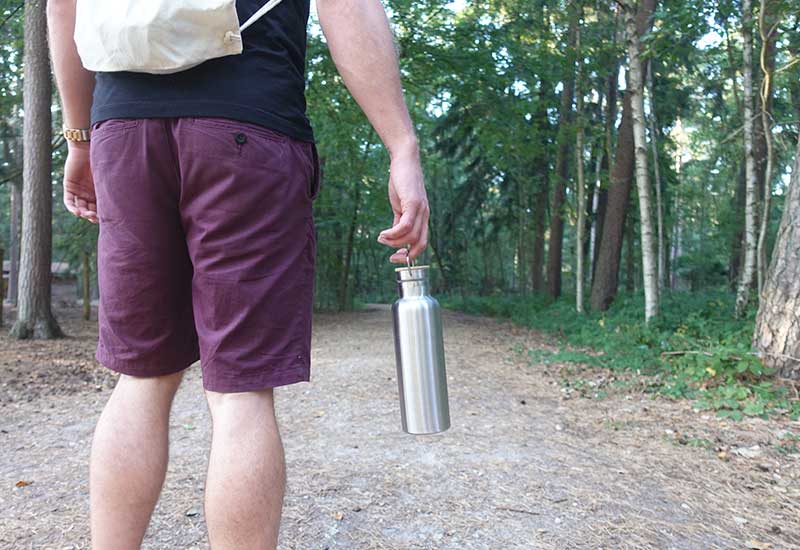
Outside of your own four walls, plastic-free living can definitely be a bit more difficult. Quite simply because you only get a small part of the Zero Waste Basic Equipment with you. Find out here how you can avoid plastic waste even when you're on the road or on an exciting trip.
Use a reusable water bottle.
Use a reusable Stainless steel drinking bottle or glass, to ban single-use plastic bottles forever and noticeably reduce your plastic waste. I personally use this drinking bottle* for many years now.
84. wear backpack made of marine plastic.
This backpack made from recycled marine plastic*. is environmentally friendly in two senses. On the one hand, for its production Garbage retrieved from the sea - on the other hand you can shop without plastic bag.
85. have reusable cutlery with you.
By always having reusable stainless steel or wooden cutlery with you, you can, among other things, easily Avoid disposable waste from plastic spoons and forks. This travel cutlery set* I can recommend to you.
86. prefer accommodations with plastic-free philosophy.
Accommodations usually generate a lot of plastic waste. So when you travel, look for hostels that consciously avoid waste to make your life even easier without plastic.
87. do not leave trash lying around.
Never dispose of your trash in the environment and leave nothing but footprints. Because Littering is a real no-go. This tip is actually self-explanatory and applies to everyday life at home as well as when traveling.
88. picking up trash on beaches.
Help keep the beaches and other ecosystems clean by also picking up trash on vacation and has it disposed of. Thereby you generate attention on the ground - especially in countries where plastic avoidance is not the top priority.
89. transport soaps in tin cans.
Transport your bar soaps in small aluminum cans, to avoid the use of plastic film and keep your toilet bag clean. These soap tins* I can recommend to you.
90. eat locally in local restaurants.
Eat locally at local restaurants when possible, even on vacation, to support the local economy and Avoid plastic waste from take-away packaging.
Tip: By the way, you can get even more inspiration in the detailed article about the Zero Waste Journey.
Community and activism
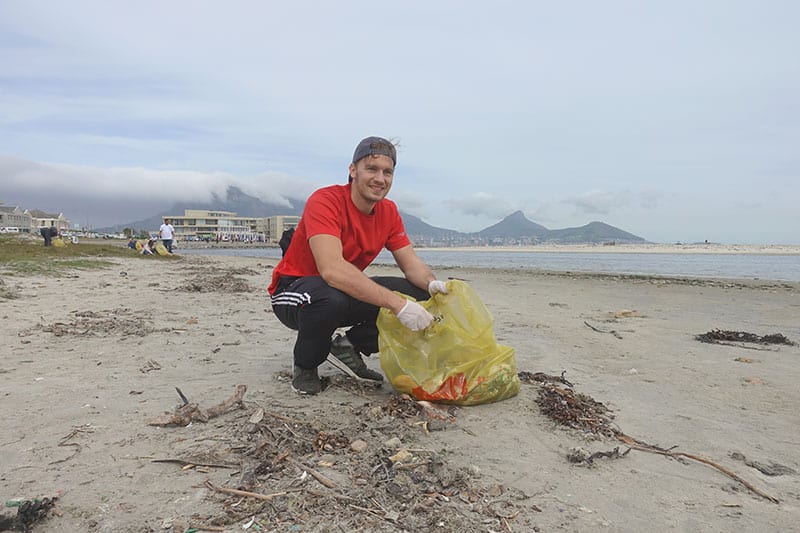
If you live plastic-free, of course you do it to make a difference. If you want to create a cosmos away from your own Create social impact and simplify everyday life without plastic for all people, I have here finally more tips for you!
91. exemplify plastic avoidance.
You are a role model for others - either a good or a bad. By living plastic-free, you show others how everyone can make an effective contribution to environmental protection.
92. watch and share documentaries about plastic waste.
Few people have ever seen totally littered beaches. To realize the plastic problem and lead more people to a plastic-free life, it therefore needs motivating image and video material.
So look at Documentaries about plastic waste and share them with others. An effective example is the film "Plastic Planet" by Werner Boote.
93. organize CleanUps and other actions.
Organize CleanUps or participate in other cleanup activities and events to draw attention to the Problem with plastic waste in the environment and its solutions and to actively do something about it.
94. jogging while picking up trash.
Combine your running sessions with garbage collection to stay fit and at the same time get plastic waste from nature. The whole thing is called Plogging and is really fun!
95. address people who leave trash.
If you see someone throwing trash into the environment or just leaving it lying around, then Speak to the person politely. A social rethink can only take place if the problem is addressed.
96. engage in politics.
If you like, you can also get involved in party politics for plastic reduction and more environmentally friendly Laws, regulations and prohibitions make strong. In this way, you yourself lay the foundation for a plastic-free social coexistence.
97. sign and share signature campaigns.
By Start online petitionssign them and share them with other people, you can Generate attention for grievances around the topic of plastic. Many successful signature campaigns prove that it can work!
Tip: Support values, sustainable petitions (also on the subject of waste avoidance) can be found in the linked overview.
98. draw attention to manufacturer:inside.
Contact manufacturers to inform them about plastic alternatives and to promote the Promote change to more environmentally friendly packaging. With the App Replace Plastic this even works quite automatically without a call, e-mail or letter.
99. invest in zero waste projects.
Your receipt is a ballot for products you'd like to have. It's similar with Cash investments or crowdfunding campaigns. To promote plastic-free innovation, you should support the companies and projects that champion positive change.
100. share these tips with other people.
My final tip for living plastic-free is to share this list of elaborately compiled tips with other people. For example, get your family excited about sustainability or share the following link of this blog article on the internet with those it might interest or help further. Thank you for your support!
https://www.careelite.de/plastikfrei-leben-ohne-plastik/
Step by step into life without plastic
Now you know why it is desirable to live as plastic-free as possible - and with which means you can achieve this goal. "WITHOUT plastic" and "plasticFREE" are terms that can seem very challenging and maybe even impossible - but every little step along the way counts. It's a marathon, not a sprint.
Nothing has to be perfect - especially not from one day to the next. Just take your time and use the tips and tricks from this article to develop yourself step by step. For even more tips and ideas, feel free to check out my Book "Plastic-free for beginners to buy. If you like, get it here*.
"The world changes by your example, not by your opinion."
Paulo Coelho (more at Zero Waste Quotes)
I really hope that I could make you aware with this article that each of us can make a real difference and live significantly more plastic-free with simple means. Do you have any questions, suggestions or further tips? Then feel free to write me a comment!
Stay clean,

PS: If you like, feel free to check out my next article on the Save paper read through, learn how to Avoid microplastics or learn how wonderfully upcycle old packaging let
References:
₁ Statista GmbH: Development of per capita consumption of plastic packaging in Germany in selected years from 1991 to 2020 (as of September 2022), available at https://de.statista.com/statistik/daten/studie/914363/umfrage/kunststoffverpackungen-verbrauch-pro-person-in-deutschland. [14.04.2023].
₂ NABU: Plastic waste and its consequences, available at https://www.nabu.de/natur-und-landschaft/meere/muellkippe-meer/muellkippemeer.html. [14.04.2023]
₃ German Institute for Economic Research e.V. (DIW Berlin): On the road to climate neutrality: plastic recycling must become more of a focus (as at 30.06.2021), available at https://www.diw.de/de/diw_01.c.820601.de/auf_dem_weg_zur_klimaneutralitaet__plastikrecycling_muss_staerker_in_den_fokus_ruecken.html. [14.04.2023]
₄ WELT: Bisphenol A gets directly into the blood via the mouth (14.06.2013), available at https://www.welt.de/gesundheit/article117122947/Bisphenol-A-geraet-ueber-den-Mund-direkt-ins-Blut.html. [14.04.2023]
₅ Federal Ministry for the Environment, Nature Conservation, Nuclear Safety and Consumer Protection (BMUV): Environmentally friendly and healthy diapers, available at https://www.bmuv.de/meldung/mai-2019-umweltfreundliche-und-gesunde-windeln. [14.04.2023]

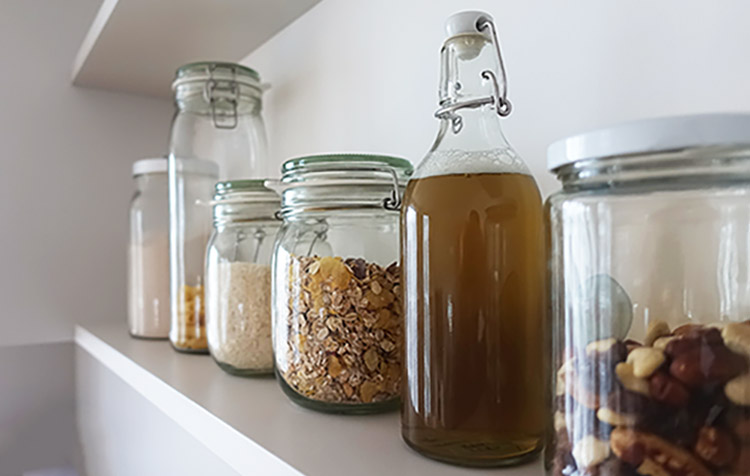
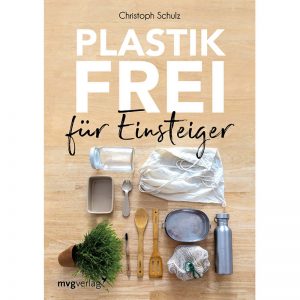
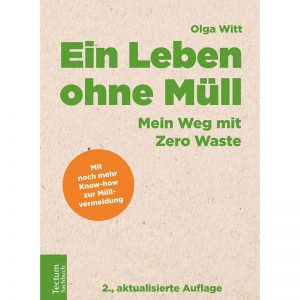
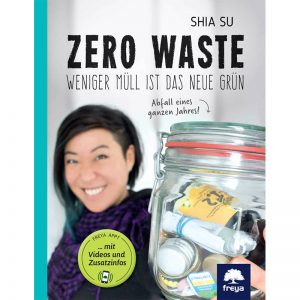
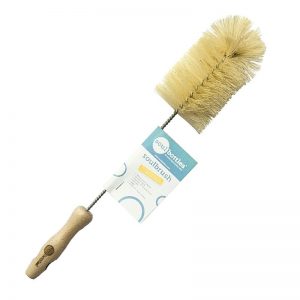
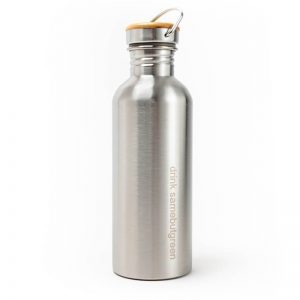
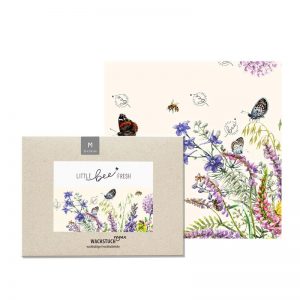
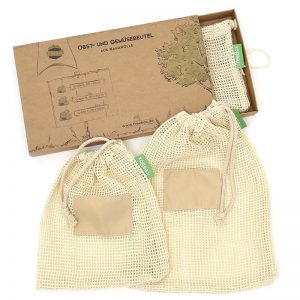
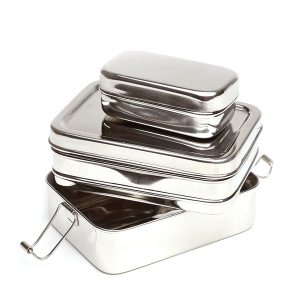



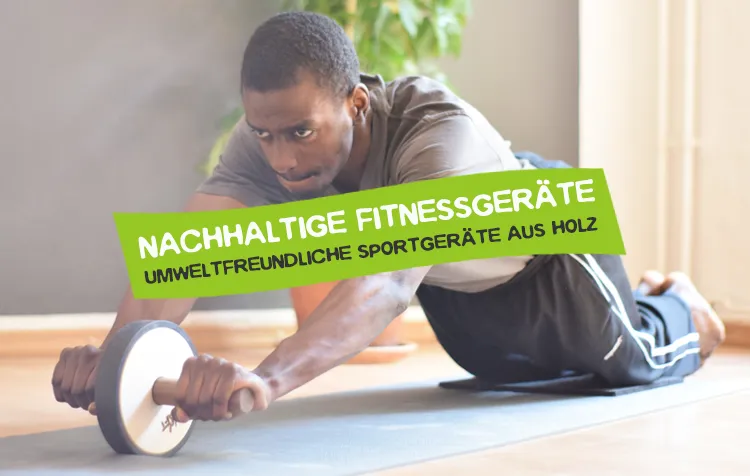
Hello Christoph,
here is another tip about brushing your teeth.
After trying different things to brush my teeth, I find this the most practical and effective:
- Wet toothbrush
- Sprinkle baking soda on the bristles
- Add 2 drops of eucaliptus oil
ready.
To remove stubborn stains or plaque, I brush my teeth once or twice a week with healing clay and then as described above.
Greetings and continued success, Heiner
Hello Heiner! Super good 🙂 Thanks for your tip, I'll be happy to try that out too! Natron is a real miracle cure and helps enormously to do without plastic. Best regards, Christoph
Hello Christoph, 🙂
here is another good tip for toothbrush salt from the jar.
Mondversand has such remedies on offer. Johanna Paungger-Poppe is the founder of Mondversand, and I have known her for many years through her books. - Everything (books and store) highly recommended.
Because of your website I have already bought quite a few items recommendations. - Finally I wrote you an email because of smile.amazon you remember? You had already answered me 🙂 .
Your green kitchen helpers have just arrived and are supposed to be on kitchen duty in the trailer ...
All the best for you and continued success.
Hi Gundula! Of course, I'm just talking to Amazon so that we all donate here with every purchase also a part to charitable projects! Mondversand I did not know yet, but I have now also on the screen.
Thanks for your words, I wish you well too and look forward to hearing from you again!
Many greetings, Christoph
There are plastic-free razors at Manufactum, and other great things for plastic-free living.
Hello Christoph,
I am a carpenter and I have the following reference in the section The kitchen without plastic to item 17. cutting board made of bamboo wood:
Bamboo wood cutting boards are an ecological disaster:
- Bamboo does not grow in Europe! It is shipped to Europe from Asia, South Africa, Central and South America.
- Production therefore often takes place in other countries in an uncontrolled manner.
- Bamboo must be glued to become a cutting board. The adhesives are not declared.
ALTERNATIVE:
Domestic wood species such as oak, maple, poplar, beech and larch. Preferably a board, so not glued and natural untreated!
Just go to the local carpenter, joiner and ask for an unglued oak board. Oak wood has a better antibacterial effect than plastic, metal or glass! (Book Tip: The gentle medicine of trees, Maximilian Moser & Erwin Thoma)
Do not put wooden cutting boards in the dishwasher! Wipe with a damp cloth is enough!
Discoloration on the wood surface is not a defect!
Super side effect: You get to know your carpenter and learn more about wood and its great properties!
Have fun with it!
Hi Peter, thank you for your great input! Some of the tips are "getting on in years" and the article is now so long that I can't always keep everything Up2Date. I just replaced the bamboo cutting boards with oak cutting boards.
Best regards
Christoph